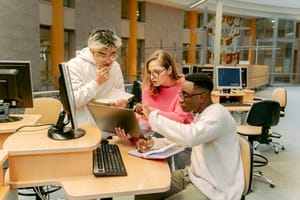From the Global North to the Global South; a bird's eye view on eLife's Community Ambassadors programme 2022
“We are all water from different rivers
That’s why it’s so easy to meet
We’re all water in this vast, vast ocean
Someday we will evaporate together”
- Yoko Ono, Japanese multimedia artist, singer, songwriter, and peace activist
Look around you, what are the problems you see in your research environment? How would you solve them? Can you make a positive change in your research community?
This is the main premise of eLife's Community Ambassadors Programme. The programme consists of a first phase of community building and learning that is followed by a second phase of activism. This year, 128 Early Career Researchers from 51 countries, representing communities from the Global North to Global South, joined the third cohort of Community Ambassadors. Under the motto “together we can make a difference”, they raise a common voice on global research community needs, and brainstorm solutions that amalgamate diverse branches of science. The first phase of the this year's Ambassadors cohort started in February and began with eLife providing a platform to get to know each other, share resources, gain new skills, participate in discussions and brainstorm ideas to drive change both locally and globally.
“There are many outstanding issues that need to be addressed in the scientific community, from how we report our results to how we support the people that generate the results. This emphasizes the deeply interconnected nature of these problems and how a multifaceted approach will be required to solve them. By building a community of early-career researchers with distinct interests and skill sets from the around the world, the eLife Ambassador’s program is catalyzing the expansive collaboration that will be required to positively impact global research culture as a whole.”
(Nick Pokorzynski, 2022 eLife Community Ambassador)
In the past 8-months, we attended workshops and lectures that addressed a broad range of topics regarding research culture in academia. One of the most important aspects of this training is that it was carried out by the protagonists or leaders on each topic, so we could learn from and relate to other people’s experiences. Getting to know the stories and people behind each initiative has been really inspiring and motivating because we could see how scientists like ourselves, with real life worries and little time, could turn a complaint or a need into a positive, concrete action.
“I am so grateful to the eLife Ambassador program, which showcases many important aspects of academia such as mental health, disability, community building, meta-research, future of research, reproducibility etc, which are usually not being touched upon during scientific training. I would appreciate it if all trainees in the world could access this program. I am happy to build collaborations between eLife and graduate programs at other educational institutions over the world in the process of advocating for this program”.
(Ruchika Bajaj, 2022 eLife Community Ambassador)
Below, we highlight 5 of the 20+ fantastic research culture events that we have had since the beginning of the programme 2022:
Science Communication
We have learnt from eLife staff, such as the head of publishing, science writers, podcasters, social media communicators, science artists to name a few- that there are infinite ways to express and communicate knowledge and discovery in research and we are excited to incorporate this into the next phase of the Ambassadors programme and our future careers.
“It’s a community of magnificently diverse, creative, intellectual, artistic-minded people, where scientists use artistic methodological tools in their science to unleash and harness the aptitudes of scientific ingenuity. ‘A picture is worth a thousand words’-- artist-minded life scientists are utilizing the power of art and visual representation of their microscopic scientific invention to attract scientists across the broader community. Such artistic notions and our intuitive visual [vision] help us to see the larger context of our scientific findings, help us to identify a tranquil way to explore our theoretical hypothesis and render into a bigger picture for the broader audience, general people."
(Suhaila Rahman, 2022 eLife Community Ambassador)
Non-english language science awareness
The non-English language science awareness session enlightened the Ambassadors on the use of language in global research and the colonial past of science communication. Interestingly the event was simultaneously translated into multiple languages by our fellow ambassadors.
Mental health and Leadership in Research
These talks focused on the need for changes in research culture to promote empathic, inclusive, and supportive leadership, while raising awareness and taking action on mental health issues that are common across academia. During the discussion, a global, multi-cultural perspective arose about the importance of taking into account diversity in mental health: not to expect the other person to be as strong or resilient as we may have previously been told that they should be in certain situations, environments and cultures. The questions that we took home were: What mental health and wellbeing support is available in our institutes and universities? Is there true leadership training and support? What are the gaps? What can we do as Ambassadors to support and change this?
Publishing preprints and learning how to review equitably
eLife’s publishing model is changing, bringing research communication into the 21st century through the publish-review-curate model. Researchers are encouraged to publish their research as a preprint to enable the rapid dissemination of discovery and rapid feedback, as eLife will review preprints directly. To achieve this goal, eLife works alongside organizations such as PREreview to train up the global research community on how to review equitably and efficiently. The 3-part PREreview workshop taught us common biases among peer reviewers and gave us tools to improve the diversity and openness of the peer review process. During the workshop, the Ambassadors received mentorship and training on constructive feedback, implicit bias in science, and nonviolent communication which finally resulted in jointly publishing a review for a preprint (https://zenodo.org/record/6914092#.YyMEhy8w0dW).
Reproducibility in Research
This topic was addressed as a workshop organized by the R4E team for us Ambassadors, in which we learned about reproducibility in science, the factors that reduce or improve reproducibility, alongside tips and suggestions for data management and reproducible workflows. The activity also included a discussion about the importance of using public repositories for protocols and data sharing, and a great take home message: What is the one thing that you can do today to start making your research more reproducible?
Next steps
The next months will be an exciting phase of brainstorming among Ambassadors and the eLife team on the proposed activism phase’s initiatives. Inspired by the people, experiences and tools we learned about during the first phase, we will develop possible solutions for local and/or global research culture issues . As these are often complex issues to tackle, a great piece of advice that we received from our community manager, Ailís O’Carroll, is to aim for progress, not perfection.
“Being part of the eLife Community Ambassadors programme during the last months opened my eyes and gave me a new perspective to challenge the way we have learnt Academia works and what it is best for researchers across the globe. The moment for change is now, and we hope to contribute to it as part of the programme. Exciting times to come!”
(Maria Eugenia Segretin, 2022 eLife Community Ambassador)
Here are some of the exciting initiatives that you can expect to learn more about over the coming year: Empower ECR Networks for New PIs, Postdocs, PhDs and young budding scientists; Awareness and normalizing the Fear of Failure in research; Guides for Research Collaboration across the globe such as with researchers in the African continent; Environmental sustainability in academia; Improving research and researcher assessment and evaluation; International LGBTQ+ Science Network and writing group; Science Career development (The Ins and Outs of a Science Career); and SciArt & SciSocial media projects.
Future Perspectives
We are looking forward to doing a follow-up meeting among Ambassadors and the organizers of the programme towards the end of the 18-months, where we will share the achievements, and also the possible difficulties, that each team encountered during the activism phase. Moreover, we hope to work with the eLife team to establish a survey with past Ambassadors to discover where they felt they achieved the goals of the Ambassador programme in their community. This will help us evaluate the true impact of this valuable approach on the international research community. Finally we hope Ambassadors will try to gather with fellow Ambassadors if and when possible to hold “In Person Meetings” to facilitate engagement and establish collaborations over the coming year.
Based on our experience, eLife's Community Ambassador programme truly is a unique opportunity to participate in an international network of people with common interests in different aspects of research culture, independently of the research topic that they are working on at the moment. We can work together towards common goals, through both local and global initiatives, supported by the experience of eLife community members.
-”Work together, gain the best for all”
(anonymous 2022 eLife Community Ambassador)
“Read more about the 2022 Community Ambassadors programme here, follow ecrLife for future updates, and get in touch with community@elifesciences.org if you are interested in helping out with the activism phase.
Image credit: Image by mohamed Hassan from Pixabay
About the author:
Maria Sol Ruiz is a biologist working on leukemias, and has a special interest in the impact of science on society. Connect with Maria Sol on Twitter.
Nalaka Wijekoon is a neuroscientist who studies neuromuscular disorders to identify biomarkers for Duchenne Muscular Dystrophy. As an eLife Ambassador, his ambition is to link Global South and Global North to promote open innovative research in Neuroscience. Connect with Nalaka on Twitter.
We welcome comments, questions and feedback. Please contact us at ecrlife [dot] editors [at] gmail [dot] com.
Would you like to share your own story, insight or opinion? Pitch us here.
Follow us on Twitter or LinkedIn to stay up to speed with our latest news and blog post releases.







